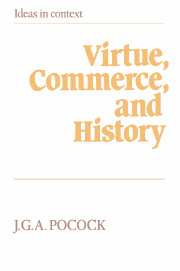 Virtue, Commerce, and History
Virtue, Commerce, and History Published online by Cambridge University Press: 05 May 2010
Of the ten essays that compose the remainder of this volume, nine were originally published between 1976 and 1982, though one or two were written for spoken delivery substantially earlier than their appearance in print. The last, which constitutes the whole of Part III, receives separate introduction. As a constellation they represent work on the history of political discourse in England, Scotland, and America, chiefly between the English Revolution of 1688 and the French Revolution of 1789, though Part III pursues the intimations of this history into the half-century following the latter event. This work has been done at a time when perceptions of “British history” are continuing to change, perhaps more drastically than for some time past, and when perceptions of what constitutes “the history of political thought” have been undergoing intensive scrutiny and restatement. Though the present volume is intended as a contribution to the practice, not the theory, of its branch of historiography, it is necessary to introduce it with a statement of where it stands in the process of change regarding the history of political thought. To describe a practice and its entailments, however, especially when these are understood to be in process of change, cannot be done without employing, and to some degree exploring, the language of theory.
I have already used two terms, the history of political thought and the history of political discourse, which are discernibly not identical. The former term is retained here, and in the nomenclature of learned institutions and journals, because it is familiar and conventional and serves to mobilize our energies in the right directions, and also because it is by no means inappropriate.
To save this book to your Kindle, first ensure [email protected] is added to your Approved Personal Document E-mail List under your Personal Document Settings on the Manage Your Content and Devices page of your Amazon account. Then enter the ‘name’ part of your Kindle email address below. Find out more about saving to your Kindle.
Note you can select to save to either the @free.kindle.com or @kindle.com variations. ‘@free.kindle.com’ emails are free but can only be saved to your device when it is connected to wi-fi. ‘@kindle.com’ emails can be delivered even when you are not connected to wi-fi, but note that service fees apply.
Find out more about the Kindle Personal Document Service.
To save content items to your account, please confirm that you agree to abide by our usage policies. If this is the first time you use this feature, you will be asked to authorise Cambridge Core to connect with your account. Find out more about saving content to Dropbox.
To save content items to your account, please confirm that you agree to abide by our usage policies. If this is the first time you use this feature, you will be asked to authorise Cambridge Core to connect with your account. Find out more about saving content to Google Drive.